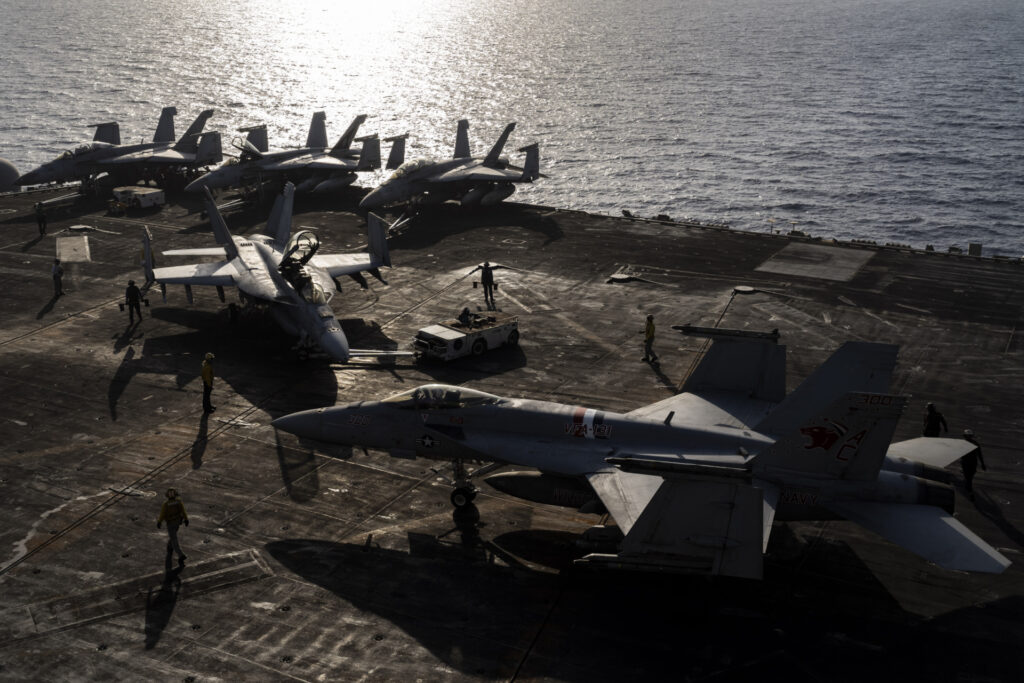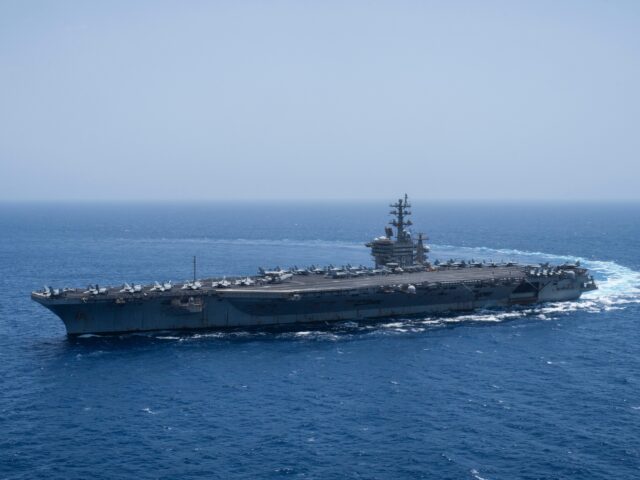The head of the Yemeni Ansarallah terrorist organization, Abdul-Malik al-Houthi, boasted in a national address on Thursday that his jihadists had turned American aircraft carriers into “obsolete weapons.”
Houthi’s group, which controls the Yemeni capital of Sana’a and received significant backing from state sponsor of terror Iran, declared war on Israel in October in support of fellow jihadist terrorists Hamas. The Houthis’, as they are commonly known, main contribution to terrorism in the Middle East has been a campaign against commercial shipping in the Red Sea in which they use drones, missiles, and other often rudimentary weapons to attack random civilian vessels in the region. The campaign has resulted in skyrocketing shipping fees and the collapse of toll revenue at the Suez Canal in Egypt as many companies choose to redirect ships around the Cape of Good Hope in Africa.
The Houthis have also done significant damage to trust in global shipping, prompting the international shipping community to issue an outraged letter in June demanding state governments act more decisively to protect civilian ships in the Red Sea.
President Joe Biden responded to the threat by announcing the creation of an international coalition, “Operation Prosperity Guardian,” in December. The operation inspired doubt from the start, as the Pentagon refused to reveal all the countries that had committed to joining it or what exactly it was planning to do in the Red Sea to protect ships. “Operation Prosperity Guardian” remains officially active at press time, but the Biden administration has offered little information on any actions taken within the scope of the operation or how it is preventing Houthi attacks.
Al-Houthi, the leader of the terrorist group, mocked American attempts to protect global shipping in his address on Thursday, which coincided with American Independence Day.

Figther jets maneuver on the deck of the USS Dwight D. Eisenhower in the Red Sea on Tuesday, June 11, 2024. (AP Photo/Bernat Armangue)
“Battle in the Red Sea has attested the fact that US aircraft carriers are an obsolete weapons system, and are not worth spending money on,” al-Houthi declared, according to a translation of his remarks by the Iranian state propaganda outlet PressTV.
“US attempts to Yemeni maritime operations are ineffective, and have so far failed to produce any promising results,” the Houthi leader claimed. “Americans have come to realize the extent of the Yemeni Armed Forces’ military might.”
Abdul-Malik al-Houthi claimed that his terrorists had committed 12 “operations” against allegedly Israeli-linked forces in the past week, according to coverage of his remarks by the Hezbollah-affiliated al-Mayadeen press network, using 20 ballistic and cruise missiles and a drone in addition to a maritime vessel.
Houthi also boasted that Washington had allegedly “retreated” from the Red Sea and “the Americans are re-evaluating their capabilities, tactics, and methods.”
“American warships in the Red Sea are being chased by missiles and drones, and they are fleeing at the highest speed they can muster,” he claimed.
Houthi terrorists claim they have attacked 162 “Israeli-linked” ships since the barbaric October 7 attack by Hamas on Israel, which killed an estimated 1,200 people and featured widespread instances of torture, gang rape, and other atrocities. The Houthis have not consistently offered accurate information on their activities, however. Independent reports suggest the Houthis launched over 70 attacks between November and June. Those attacks have featured the sinking of two ships – the Belize-flagged MV Rubymar in February and the Greek-owned MV Tutor – and attacks on several ships with ties to Houthi allies.
Ansarallah claims that it only attacks ships affiliated with Israel, America, and Britain, the latter two in response to airstrikes in Yemen meant to degrade Houthi capabilities to target ships in the Red Sea. In reality, however, Houthi attacks often appear to be targeting random commercial ships. An assessment by the American Defense Intelligence Agency (DIA) this week indicated that Houthi attacks have affected 65 different countries, including Houthi-friendly nations such as Russia, China, and top patron Iran. Some of those attacks have targeted ships previously owned by American or British entities, suggesting the Houthis are using outdated information to choose targets.
RELATED: U.S. Forces Strikes Houthi Targets in Red Sea Show of Defense
The shipping industry has shown signs that it does not expect the attacks to end anytime soon. The CEO of Maersk, one of the largest shipping companies in the world, issued a statement on Monday lamenting that the added costs of business created by the Houthi attacks will likely become more “deeply ingrained” as world powers do nothing meaningful to stop them.
“We don’t know yet exactly how much of these costs we will recover and for how long. The higher rates we are seeing right now are of a temporary nature,” Vincent Clerc, the Maersk CEO, said. Clerc lamented that attempts to encourage American and European government officials to take more decisive action against the Houthis have been “unsuccessful.”
A statement published in June and signed by over a dozen shipping industry companies expressed similar frustration.
“This is an unacceptable situation, and these attacks must stop now,” the statement read. “We call for States with influence in the region to safeguard our innocent seafarers and for the swift de-escalation of the situation in the Red Sea.”
“We have heard the condemnation and appreciate the words of support, but we urgently seek action to stop the unlawful attacks on these vital workers and this vital industry,” the companies demanded.
Follow Frances Martel on Facebook and Twitter.

COMMENTS
Please let us know if you're having issues with commenting.